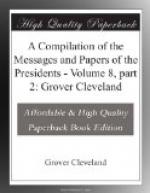JAMES MADISON.
NOVEMBER 17, 1812.
To the Senate and House of Representatives of the United States:
I transmit to Congress copies of a letter from the consul general of the United States to Algiers, stating the circumstances preceding and attending his departure from that Regency.
JAMES MADISON
WASHINGTON, December 11, 1812.
To the Senate and House of Representatives of the United States:
I transmit to Congress copies of a letter to the Secretary of the Navy from Captain Decatur, of the frigate United States, reporting his combat and capture of the British frigate Macedonian. Too much praise can not be bestowed on that officer and his companions on board for the consummate skill and conspicuous valor by which this trophy has been added to the naval arms of the United States.
I transmit also a letter from Captain Jones, who commanded the sloop of war Wasp, reporting his capture of the British sloop of war Frolic, after a close action, in which other brilliant titles will be seen to the public admiration and praise.
A nation feeling what it owes to itself and to its citizens could never abandon to arbitrary violence on the ocean a class of them which give such examples of capacity and courage in defending their rights on that element, examples which ought to impress on the enemy, however brave and powerful, preference of justice and peace to hostility against a country whose prosperous career may be accelerated but can not be prevented by the assaults made on it.
JAMES MADISON.
JANUARY 22, 1813.
To the Senate and House of Representatives of the United States:
I transmit, for the information of Congress, copies of a correspondence between John Mitchell, agent for American prisoners of war at Halifax, and the British admiral commanding at that station.
I transmit, for the like purpose, copies of a letter from Commodore Rodgers to the Secretary of the Navy,
JAMES MADISON.
FEBRUARY 22, 1813.
To the Senate and House of Representatives of the United States:
I lay before Congress a letter, with accompanying documents, from Captain Bainbridge, now commanding the United States frigate the Constitution, reporting his capture and destruction of the British frigate the Java. The circumstances and the issue of this combat afford another example of the professional skill and heroic spirit which prevail in our naval service. The signal display of both by Captain Bainbridge, his officers and crew, commands the highest praise.
This being a second instance in which the condition of the captured ship, by rendering it impossible to get her into port, has barred a contemplated reward of successful valor, I recommend to the consideration of Congress the equity and propriety of a general provision allowing in such cases, both past and future, a fair proportion of the value which would accrue to the captors on the safe arrival and sale of the prize.




